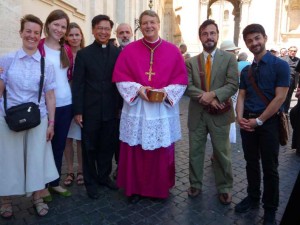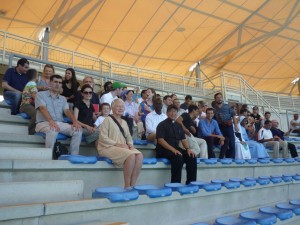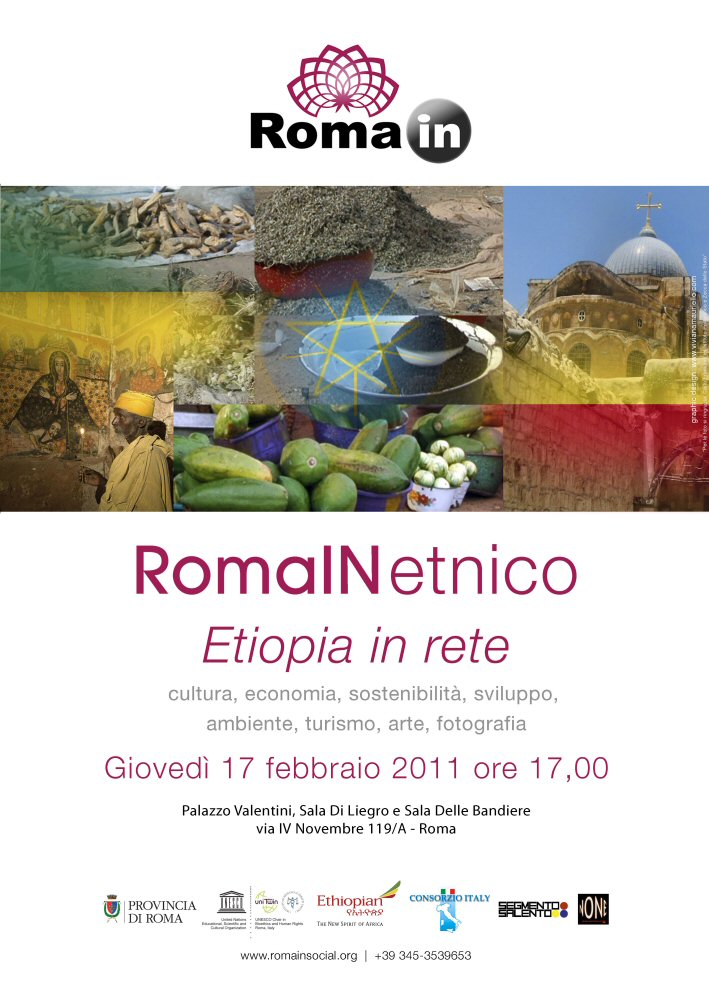Oct 15, 2015 | News
by Michael Baggot
In a recent Huffington Post blog entry, the Wexner Scholar at Rabbi Isaac Elchanan Theological Seminary Mark Weingarten recounts his experience at the summer course on Human Ecology co-sponsored by the Chair. Despite his cultural, religious, and age differences from many of the course’s participants, the young rabbinical student quickly found it easy to dialogue with his companions on the importance of promoting the vision of human ecology articulated in the Pope’s most recent encyclical Laudato Si’. For instance, he found in an England priest devoted to child protection and foster care a distinctly dressed companion in the common quest to create a more humane society open to the positive influence of faith in a world often characterized by individualism and skepticism.
Regina Apostolorum’s shared commitment to intellectual charity finds a uniquely multicultural and inter-religious dimension in the UNESCO Chair, which has facilitated since its 2009 foundation enriching encounters akin to Weingarten’s brief summer experience. Jointed hosted by the Bioethics faculty of Reginia Apostolorum and the Law faculty of the European University of Rome, the Chair dedicates intellectual resources to creating constructive dialogue on society’s most pressing issues among peoples of all backgrounds in order to contribute to a civilization of justice and love. The Chair seeks to create a forum of diverse bioethics thought leaders. Collaborating in a spirit of respect and friendship, it hopes to deliver a common framework to guide the application of bioethical principles in the light of the UNESCO Declaration. In this manner, it can inform and enlighten ethical, legal and public opinions, decisions and actions relative to medicine, life sciences, and human rights and responsibilities.
The intellectual charity at the root of the institute’s spirit of respect and friendship in collaborative work has found concrete expression in a series of international workshops on Bioethics, Multiculturalism, and Religion. In Jerusalem, Rome, Hong Kong, and Mexico scholars from seven faith traditions have gathered to analyze key bioethical themes. The intellectual charity driving these events has overcome all conflict between the apparently warring values of rigorous academic research and warm familial relations. Since the days include not only the presentation of prepared papers, but also ample time allotted to the open discussion of these works, there is a lively interchange that could easily degenerate into combative chaos without the exercise of virtue. Thanks to the intellectual charity that reigns, participants have spent the past years growing in mutual understanding and appreciation for their respective faith traditions, while also enjoying the confidence to challenge their companions to an ever more profound comprehension of the truth toward which all participants strive as companions. The sometimes fiery debates that ensue after certain presentations enable the speakers to revise their work before the final papers are published together by the prestigious company Springer. Again, when participants identify disagreements inevitable among such a culturally and religiously diverse body, they always do so with the utmost respect toward their fellow scholar and friend.
Further evidence of the force of this intellectual charity is in the informal exchanges that continue during the year. It is not uncommon for a professor of Buddhism in Hong Kong to email a Catholic priest question regarding the Magisterium’s view on a recent medical development. Nor is it uncommon for a Catholic lawyer from Spain to contact an expert in Hinduism in Houston regarding collaboration on an article. Intellectual charity sustains these relationships across the globe and strengthens the humility that enables individuals of differing worldviews to learn from each other and grow in the common quest for truth. Thus, the Chair’s international mission of “fostering the art of convergence and cooperation in global ethics” remains one of the university’s manifold manners of living its commitment to intellectual charity.
Jul 11, 2015 | News
The 14th International Summer Course in Bioethics “Bioethics, Environmental Issues, and Human Ecology” was held from June 30 to July 10, 2015. The course was organized by the School of Bioethics of the Regina Apostolorum (APRA) and the Faculty of Bioethics of the Universidad Anáhuac Norte, in collaboration with CESAB (Center for Research in Environmental Sciences and Biotechnology), the UNESCO Chair in Bioethics and Human Rights, and the Institute of Religion and Science of APRA.
The course offered a broad range of international participants the opportunity to study today’s headline-grabbing environmental themes from a rich interdisciplinary and multicultural perspective. The course came began only two weeks after the public release of Pope Francis’ widely-discussed encyclical Laudato Si’: On Care for our Common Home and only a few months before the world turns its attention toward France for the United Nations Paris Climate Change Conference.
Aside from the hours spent in lectures, small-group discussion, and informal meetings between events, the participants were able to learn about marine biodiversity first hand through a guided visit to the aquatic park “Zoomarine di Torvaianica” in Rome. Students also enjoyed an encounter with the internationally renowned bioethicist Metropolitan Archbishop of Sydney, Australia, Anthony Colin Fisher, O.P and with Monsignor. Jean Laffitte, secretary of the Pontifical Council for the Family.

Although bioethics since the 1970s has addressed issues tending toward the biomedical, it had in its origins, in the thinking of some of the pioneers, a strong interest in environmental issues. The deepening ecological crisis necessitates, again and decisively, that this modern science examines this question. The course is therefore intended to deal with an interdisciplinary methodology on such issues of great public interest as pollution, resource management, the energy issue, climate change, biodiversity, environmental biotechnology, and animals. It is evident, however, that if these issues are the responsibility of bioethics, solutions cannot and should not be completely of a technical nature. To go to the roots of the environmental crisis and then to find the guidelines for effective solutions, we must broaden our vision to include ethics, anthropology, theology: what is the place and role of man in the environment; how to discern the ethical nature of human behavior towards animals; and ultimately, where is the foundation of respect we owe to the non-human world. The course finally highlighted the Christian vision of the environment, which provides valuable guidance to the balance between conservation and development within the pastoral care of creation in respect of that original mandate to man to “till and maintain.” The course affirmed that where human ecology is respected, the environment is the prime beneficiary.

Jul 1, 2015 | News
The latest edition of the journal Studia Bioethica offers an in-depth analysis of the concept of human ecology that has garnered international attention since the publication of Pope Francis’s encyclical letter on Laudato Si’: On Care for our Common Home. The issue’s articles can be read online here.
Feb 17, 2011 | Senza categoria
Il 17 febbraio 2011, ore 17.00 a Palazzo Valentini in via IV novembre 119/A, si terrà il secondo appuntamento della rassegna RomaINetnico, per incontrare le realtà etniche che vivono e lavorano in Italia, e farle entrare in contatto con la realtà italiana e romana al fine di creare e alimentare una rete attiva e creativa.
Il contenuto del progetto, patrocinato dalla Provincia di Roma, con ospiti istituzionali ed esponenti della cultura, delle associazioni e dell’imprenditoria, è legato a temi quali cultura, sostenibilità, ambiente, business, sviluppo della rete, arte, fotografia, con l’obiettivo di creare legami tra l’Italia e i paesi le cui comunità sono attive nel nostro Paese.
E’ prevista la proiezione di trailer documentaristici sull’Etiopia.
Uno spazio importante sarà dedicato al networking per lo scambio di idee, conoscenze, e biglietti da visita, davanti ad un piacevole cocktail.
Informazioni logistiche
RomaINetnico – Etiopia in rete
17 febbraio 2011, ore 17.00
Palazzo Valentini, sala Di Liegro
Via IV novembre 119/A, Roma
Ingresso libero con prenotazione http://www.romainsocial.org/prenotazioni/
Mezzi pubblici: metro Colosseo. Bus http://www.atac.roma.it/index.asp?p=2#top
Passaggio auto per evento: www.roadsharing.com
Programma
16.30 – Saluti e registrazione
17.00 – Inizio lavori (aggiornamenti sul sito) www.romainsocial.org
19.00 – Networking guidato e aperitivo
RomaIN
Segreteria organizzativa: 345-3539653
Prenotazioni: http://www.romainsocial.org/prenotazioni/
Ufficio Stampa: RomaIN associazioneromain@gmail.com
Feb 17, 2011 | News

Il 17 febbraio 2011, ore 17.00 a Palazzo Valentini in via IV novembre 119/A, si terrà il secondo appuntamento della rassegna RomaINetnico, per incontrare le realtà etniche che vivono e lavorano in Italia, e farle entrare in contatto con la realtà italiana e romana al fine di creare e alimentare una rete attiva e creativa.
Il contenuto del progetto, patrocinato dalla Provincia di Roma, con ospiti istituzionali ed esponenti della cultura, delle associazioni e dell’imprenditoria, è legato a temi quali cultura, sostenibilità, ambiente, business, sviluppo della rete, arte, fotografia, con l’obiettivo di creare legami tra l’Italia e i paesi le cui comunità sono attive nel nostro Paese.
E’ prevista la proiezione di trailer documentaristici sull’Etiopia.
Uno spazio importante sarà dedicato al networking per lo scambio di idee, conoscenze, e biglietti da visita, davanti ad un piacevole cocktail.
Informazioni logistiche
RomaINetnico – Etiopia in rete
17 febbraio 2011, ore 17.00
Palazzo Valentini, sala Di Liegro
Via IV novembre 119/A, Roma
Ingresso libero con prenotazione http://www.romainsocial.org/prenotazioni/
Mezzi pubblici: metro Colosseo. Bus http://www.atac.roma.it/index.asp?p=2#top
Passaggio auto per evento: www.roadsharing.com
Programma
16.30 – Saluti e registrazione
17.00 – Inizio lavori (aggiornamenti sul sito) www.romainsocial.org
19.00 – Networking guidato e aperitivo
RomaIN
Segreteria organizzativa: 345-3539653
Prenotazioni: http://www.romainsocial.org/prenotazioni/
Ufficio Stampa: RomaIN associazioneromain@gmail.com



